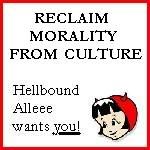The Morality Disconnect part 1
 This entry is part of the War on Relativism.
This entry is part of the War on Relativism.There is a basic, flagrant and irrational disconnect in the way that even most rational atheists treat morality compared to everything else.
If you buy a house, you will consider various factors, such as location, proximity to malls and schools, taxes, value, size, etc. If you are a rational person, you will NOT consider your traditions, culture, religion, or belief system as criteria in choosing the house.
If you choose a line of work or career, you probably consider your own education, potential salaries, requirements of travel, and that sort of thing. If you are a rational person, you will NOT consider your traditions, culture, religion, or belief system as criteria.
I think these two examples are very intuitive. I think you'll agree with me on this, especially if you're an atheist.
If you look at social institutions, you likewise desire or expect them to be based on facts. Scientific research, for example, is based on observations and tests which are precisely designed to eliminate such non-factual bias. And so is engineering. The last thing you want when you're in a car, is to have a car built on religious or cultural principles.
Two other examples. You expect a rational court system (not the one we have now, obviously) to judge people based on the facts, not on their culture or religion. Religion is something that atheists have no problem critically examining on the basis of facts. They argue that this or that religious principle, or this or that belief, does not correspond to reality. As it should be !
In fact, I have no doubt that many people reading this would agree with me that we would all be much better off if social organization in general was regulated by facts, and not by culture, religion or beliefs.
And now we come to the rub : MORALITY.
In this area, even the most reasonable atheist will do a total backflip and argue persistently and arduously that morality is NOT based on facts. He will argue that morality is based on culture, religion or beliefs - anything BUT facts.
Why do reasonable people have this complete disconnect between morality and everything else ?
I think there are many reasons for this, including :
1. Religious education, which states that "morality" is duty to God, and that anything else is immoral. This means that everyone believes that is what morality is, even though it has no causal basis and has nothing to do with morality.
2. Democratic education, which holds as premise that anyone's opinion is equally valid and can only be singled out by what basically amounts to popularity contests.
3. Multiculturalist education, which opens people to the world, is a good thing - but without the ability to determine what good and evil are, it is a bad thing.
My best hypothesis right now is that this disconnect exists because it piggy-banks on religious and political indoctrination, because relativism is inherent to religious and political indoctrination. If you go around and say that values can be based on facts instead of beliefs and that you, as an individual, can find it out, then you are kinda going against the whole purpose of these belief systems.
Continue to part 2.





Post a Comment
3 Comments:
I'm a litte disappointed by the insistence that all atheist see moral judgements as 'nothing to with facts.' I'm an atheist, and I think there are moral facts. And - what is a seperate issue - I don't dismiss moral judgements as merely a product of one's culture.
For an honest, reflective person, I want to add, it is difficult to hold that there are moral facts. It is difficult to understand quite what this means, how we find out about them, and what makes them true. So that's one unmentioned reason for avoiding moral realism.
But even so, this is a seperate issue from whether moral judgements are justified at all, whether there are any reasons for holding particular moral beleifs over others. This I think almost every reflective person will hold to, consciously or not. Most of us engage in moral debate or reflection sometimes, and this is a commitment that moral judgements can be justified.
check out Adler's "Six Great Ideas."
The ideas are truth, goodness, beauty, libety, equality and justice.
Seems like Plato also had a thing or 3 to say about morality without reference to gods.
You are confused between the concepts of epistemilogical facts and moral 'facts'. The former may influsence the latter, only so far as to establish events. There are no free floating facts of a moral nature. It makes no sense that there could be. Do you believe there can be beauty 'facts'?
Can someone be literally wrong to believe that another person is beautiful? There may well be espistemilogical facts that have baring. Person B has a much larger than average nose. This is an objective fact, provable by measurement of many noses. Does this have ANY baring on whether or not person A finds them attractive? There are no objective beauty facts. Morality is a similar concept. One person might support the death penelty, another might think it is wrong. There can be no factual answer to their disagreement. It is a matter of opinion. The irony here is that you are accusing other atheists of being remiss in accepting moral relativism but yet it is the religious who propose objective moral fact. That, of course, has no baring on its truthfulness but the comment seems relevant to the tone of the post.
<< Home